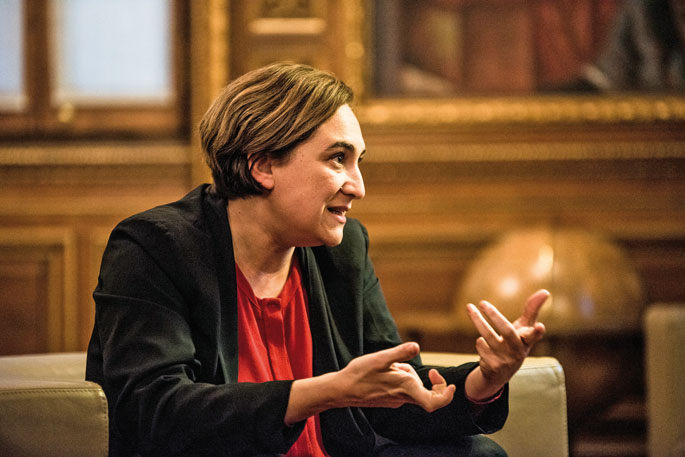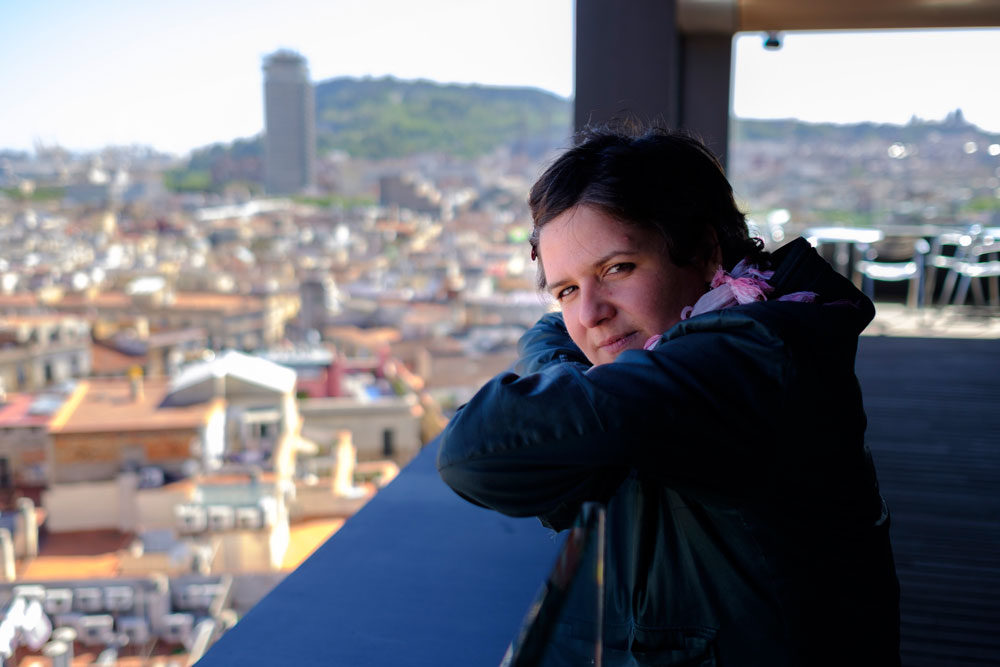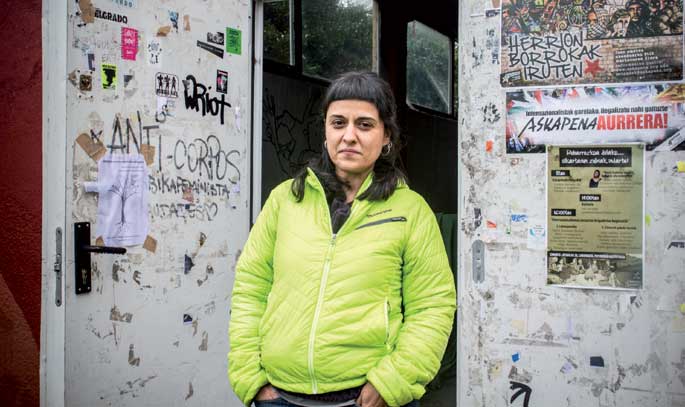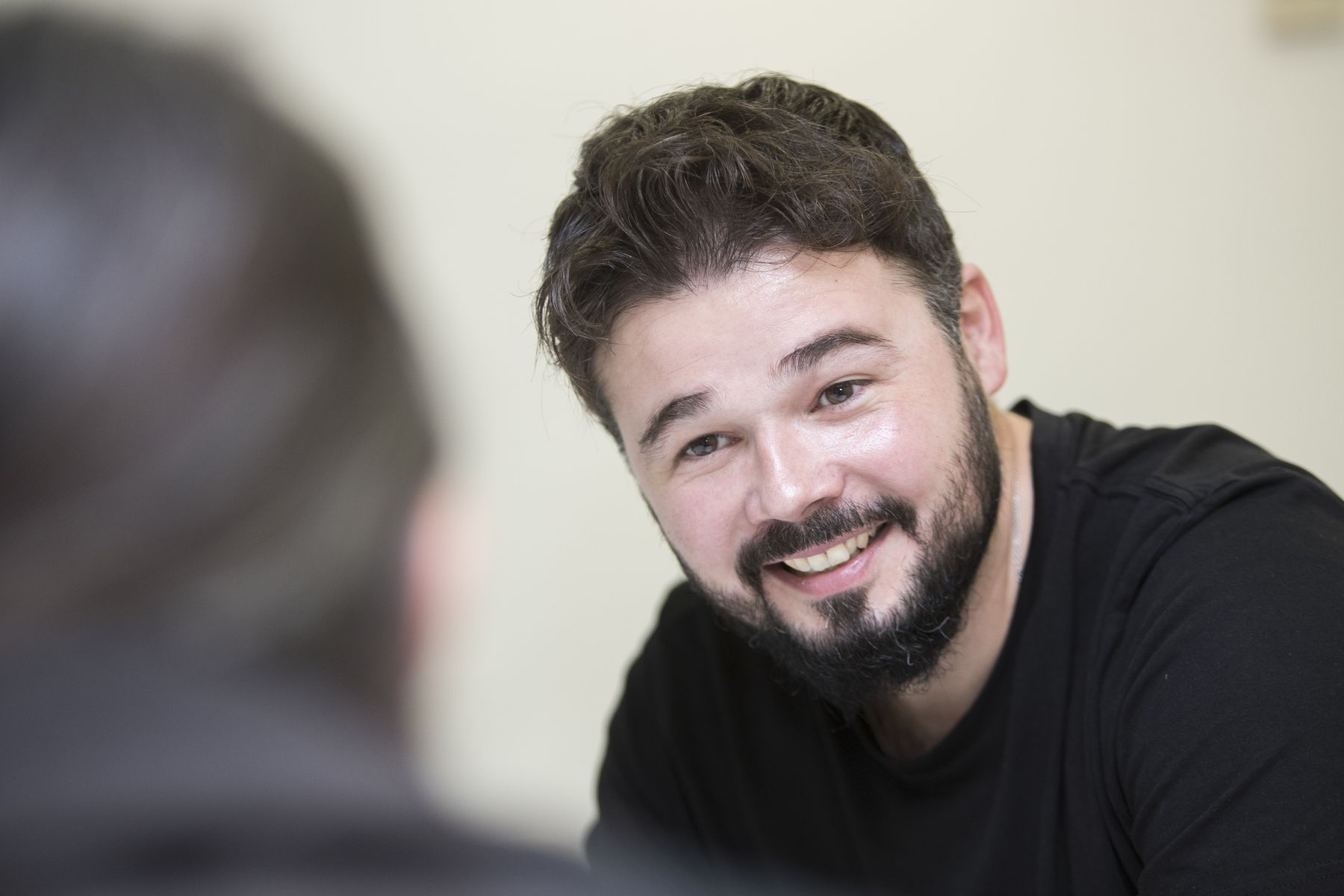"Discussing the tourism model is discussing the city model"
- Ada Colau is the first mayor of Barcelona. The mayor of Barcelona in Comú, after five months in office, and ruling in a minority with 11 councillors, one more than CIU, urges the other municipal forces to reach an agreement. It calls on citizens to be “vigilant”. This is an interview conducted by La Buena before the presidential elections this Sunday.

Does the existing municipal institutional framework have limits to be able to carry out the transformations that Barcelona in Comú (BeC) initially proposed?
It is clear that the Municipality has limits that we do not like or want. The municipal administration provides most of the direct services: people social services, housing, etc. He asks them. On the other hand – and this is not by chance – the design that took place after the transition completely reduces municipal sovereignty, which gives it the scarce resources compared to all administrations.
According to what you have in your hands, what reform do you propose to make an institution such as that of the City Hall more democratic?
On the one hand, we are much more limited than we would like, but on the other hand, there is a great opportunity and it depends on political will. How far did we get? The answer is not in our hands, but – once again – we will return the question to the whole of citizenship. We, right now, are a minority government, eleven of the 41 councillors. What can be done will depend on what has been agreed with the other forces and in a broad sense, on the will of the city: the social movements, the organizations and the plurality of actors involved. For things to change, co-responsibility is necessary.
Why did you bet on choosing former councillor Jordi Martí as City Hall Manager? Do you think that your salary, of EUR 97,000 per year, should be in line with your ethical code?
The figure of the municipal manager is a less easy technical profile to find. It is primarily responsible for the technical and executive structure. The Basque Government has audited 12,000 workers and a budget of over EUR 2.5 billion. When we won the elections, we had to name a bunch of senior officials that had not occurred to us before. We have never ruled before, that is a well-known fact. I went to ask people for advice with a lot of political confidence and I was recommended to Jordi Martí. We proposed it and accepted a reduction in the salary that I had previously earned as a municipal manager. He signs decisions at a cost of millions of euros. In these first few months it is going well, the truth is that I am happy. In this respect, we need to reflect collectively on the minority and majority salaries of the directives and directives.
One of the promises of the BeC election campaign was to dissolve the Administrative Police and Security Unit (UPAS, now USP), in Madrid. Why have they not yet dismantled this riot control unit in the Municipal Police?
As soon as he arrived at the City Hall, the Municipal Police was ordered to stop acting against the incidents. Public order is not a matter for the local authorities, but for the Mossos de Escuadra. However, another debate is the model that the Municipal Police should have.
Do police operations solve the problems that have arisen in the field of street vendors?
From the point of view of social rights we have set up a working group to be in direct contact with the collective and with other actors involved, in order to seek short- and long-term solutions. Meanwhile, the Municipal Police must continue its work, with the management of public space. We think that, instead of attacking the street vendor, we have to look at what happens to the goods and find out who counterfeits them and who is enriched by their sale. We have also called for greater cooperation with the various administrations concerned, in order to go to the root of the problem and prevent the most vulnerable from being persecuted, precisely, by street vendors.
They have a commitment to make a review of the ordinance, but so far no changes have been made. Have measures been taken?
We must work towards a new coexistence pact in order to overcome the framework of the citizenship ordinance. Today it is overtaken and an approach must be made that does not focus on grief. That view is not just ours, injustice unions think the same thing. We have set up a cross-cutting working group at the internal level to receive information in different areas. Subsequently, we will have to work with the other municipal groups to agree a new pact of coexistence with neighborhood associations, traders and injustices unions.
Are you in favor of sustainable tourism to reduce the number of beds in the most affected neighborhoods? What measures do you have?
In a large city like Barcelona there are conflicting interests, and also neighborhoods that due to tourist pressure have a great influence. There are those who think that we are doing too little to lose weight to [tourism], and on the other hand there are large business and commercial sectors that consider that we are doing too much. We have always agreed with the neighbours and neighbours of the neighborhoods where the tourist pressure has had the greatest impact. During the campaign we committed ourselves to the suspension of the new tourist charter, many of us came from the neighbourhoods affected by tourism and we are well aware of the problems, the gentrification processes and the speculation of property that it entails. There has also been no political leadership in the tourism sector: the previous government allowed companies in the sector to develop chaotic.
Faced with this, our priority is to govern the tourism sector, which until now had no democratic control. Firstly, the new tourist rental licences were temporarily abolished. We also created the Municipal Tourism Council, a democratic space for debate among citizens. Its Rules of Procedure will be adopted in plenary in December. The aim is to do an X-ray of the current situation: there are many elements missing to decide whether Barcelona can grow or should grow in the tourism sector. These issues must be raised democratically, listening and giving voice to all. The existence of private interests and business is normal, but first of all there are general interests such as the right to public space, to housing or to rest.
Discussing the tourism model is discussing the city model. Today, the tourism model is a threat to the city model, which is not sustainable. There are tourist bubble rates and tourist activity must be organised in order to benefit all citizens.
On September 22, the City Council approved the measure of making Barcelona a City of Refuge, and in 2015 the City Council allocated EUR 10.5 million to deal with the refugee crisis. Are they going to exhaust this year's budget?
Barcelona wants to be a host city. We believe that dealing with the refugee crisis is a moral and political duty for any public administration. Through the Service for Migrants, Migrants and Refugees (SAIER), the City Hall already has a very advanced reception policy, with very good technical services for social affairs. In anticipation of the arrival of refugees, we have worked on a reception plan to improve services and care for people in serious situations. Furthermore, in Barcelona there are people from Ukraine, Syria, Iraq or Eritrea who have applied for asylum, but the State does not recognise them. Although we do not have the legal status of refugees, we are offering these people all municipal services.
Bartzelonako alkate Ada Colauren aburuz, azken hauteskundeek bi gauza utzi zituzten agerian: independentziaren gaiak Katalunia bi bloketan banatzen duela eta, batez ere, gehiengo demokratiko batek erreferendum lotesle bat egitea nahi duela.
Errefuxiatu siriarrei aterpea eman nahi die Bartzelonak eta horretarako neurriak hartzen hasi da Udala. Acnur eta asiloaren aldeko Asil.cat erakundeekin harremanetan jarri da dagoeneko Ada Colau alkatea.
Bizitzaren Zikloa, Feminismoa eta LGTBI Saila sortu du Ada Colauk Bartzelonako Udal gobernu berrian. Kritikak jaso ditu erabakiak, bazterreko kolektiboak bazterreko eta ikusezin izaten jarraitzea nahi duelako hainbatek.
Maiatzaren 24ko hauteskundeen ondoren hautatuak izan diren hainbat lagunek agerraldi jendetsu baten bidez jakinarazi dute hilaren 26an Katalunian Telefonica-Movistarreko grebalarien “Eskaileren konpromisoa” sinatuko dutela.
Hauteskundeen jarraipena egiten ari gara minutuz minutu. Emaitzak eta ondorengo balizko paktuak.
Duela bi urte sortu zen Prozesu Konstituziogilea, Kataluniako Parlamentuko hurrengo hauteskundeetarako ezkerreko alderdien batasuna lortzeko helburuarekin. Arcadi Oliveres bozemaileari elkarrizketa egin dio Vilawebek eta eduki garrantzitsuenak laburtu ditugu.
Pablo Iglesias bozeramaile duen Podemos alderdiak 2015eko udal hauteskundeetan nola parte hartuko duen erabakiko du udazkenean. Baliteke alderdi gisa aurkeztu ordez, herritarren hautagaitzak babestea “behar adinako ziurtasuna” daukatenean.
“Hiri ezberdin bat eraikitzea posible dela erakusteko ordua heldu da”. Helburu horrekin jaio da Guanyem Barcelona, Ada Colau - PAH Kaleratzerik Ez elkartearen bozeramaile ohiak bultzatutako plataforma herritar berria. Ekainaren 26an egingo dute publiko beren... [+]























